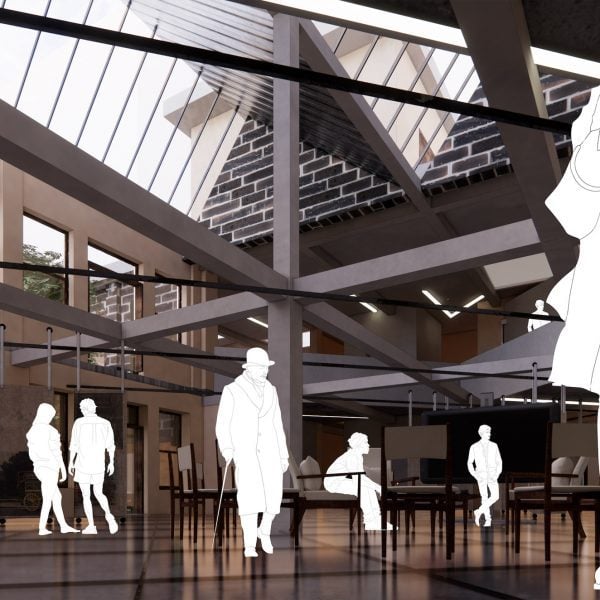Dezeen School Shows: a textiles project which incorporates Bangladeshi weaving techniques is included in Dezeen’s latest school show by students at University of the Arts London.
Also included is housing intended for artists, alongside a wardrobe which takes cues from both postmodernism and Polish design.
Institution: University of the Arts London
School: Chelsea College of Arts
Courses: BA (Hons) Fine Arts, BA (Hons) Graphic Design Communication, BA (Hons) Interior Design, BA (Hons) Product and Furniture Design, BA (Hons) Textile Design, MA Curating and Collections, MA Fine Art, MA Textile Design, Graduate Diploma Fine Art, Graduate Diploma Graphic Design, Graduate Diploma Interior Design and Graduate Diploma Textile Design
School statement:
“Chelsea College of Arts has a reputation for producing some of today’s leading artists and designers.
“Our students are encouraged to radically engage with contemporary fine art and design practice. We offer fine art, design and curating courses.
“At Chelsea, we look at art and design in a social, cultural and political context. We are particularly interested in the effects of globalisation. – this could either be on the creative practice itself or its response to it.
“View our recent graduates’ work online here: UAL Showcase.
“Join our open days to learn more about Chelsea College of Arts and our courses.”
Fabricate Furniture Kit by Charlotte Hamilton
“Around 22 million pieces of furniture are discarded each year in the UK and less than one in ten people consider repairing their furnishings to extend its life span.
“Due to the endowment effect, an effect in psychology that explains the tendency to overvalue things we own or have made – making your own furniture could begin to solve the furniture waste issue.
“I created a furniture kit which makes woodworking accessible through teaching and up-skilling in order to reduce furniture waste.
“You can build your own chair, stool or table using basic woodworking skills.”
Student: Charlotte Hamilton
Course: BA Product and Furniture Design
Email: charham2807[at]gmail.com
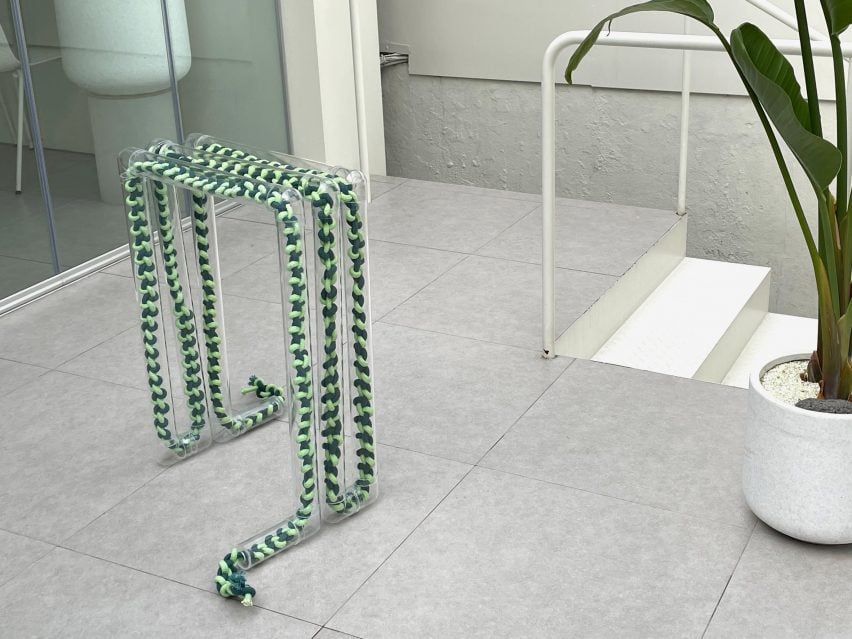
One-1ine series by Jaeun Sim
“I am a multidisciplinary artist and researcher interested in sculptural objects.
“My work focuses on material culture as well as the customs and beliefs surrounding objects and it is intended to connect with the viewer on an individual basis.
“My furniture designs give users freshness and fun – they are produced using a new combination of materials.
“I combined weak materials, such as thread, with other materials that together create a 3D object that can support people and objects.”
Student: Jaeun Sim
Course: BA Product and Furniture Design
Email: simjaeun0503[at]gmail.com
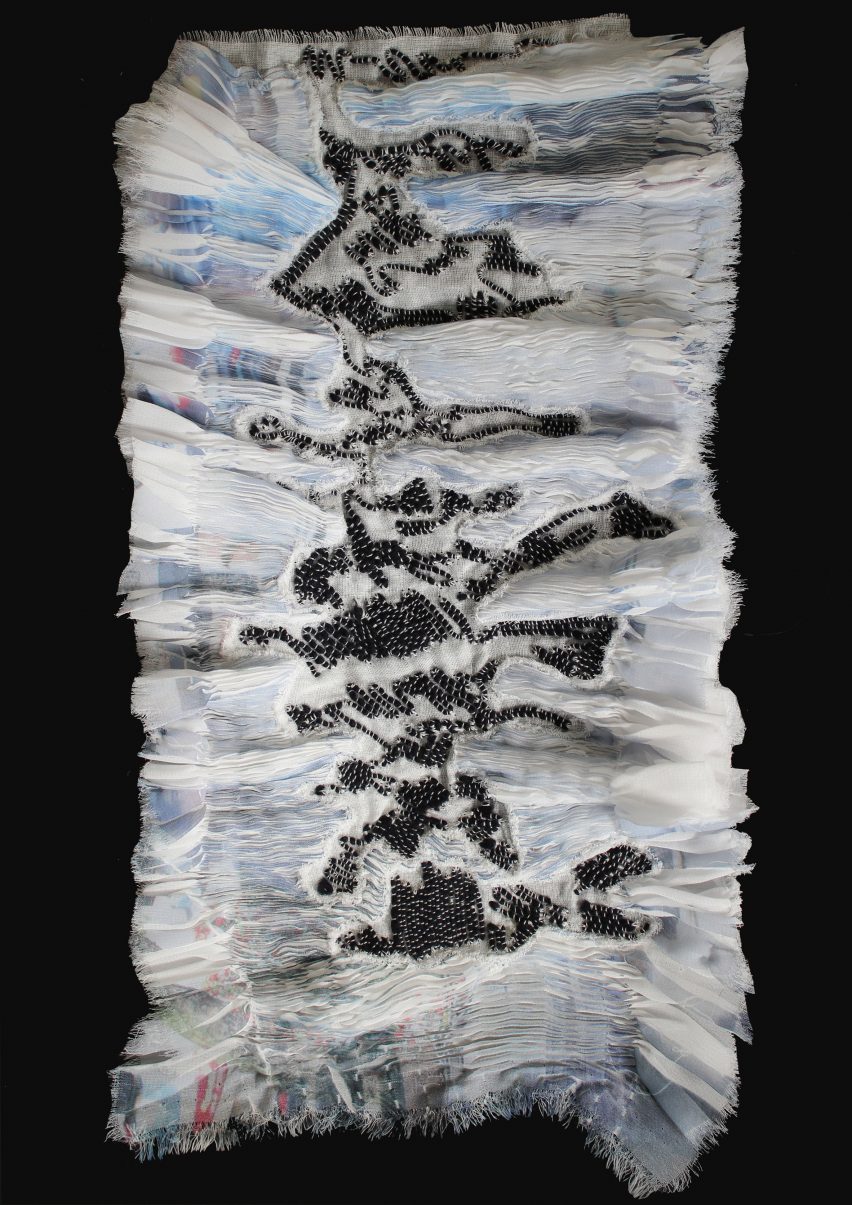
The Flexibility of Self-identity by Jing Wang
“My project examines human actions and interactions within society to reveal how these norms influence identity.
“By focusing on daily behaviours and interactions, I highlight the profound impact of societal expectations on identity.
“Using the language of textiles, I challenge traditional definitions and showcase the diversity and flexibility of individual identity. I transform my paintings into textiles using discarded objects as references, creating mixed media drawings inspired by street scenes.
“This process involves hand-drawing human trajectories and overlaps, translating these visual elements into textile designs that challenge conventional uses and definitions.”
Student: Jing Wang
Course: BA Textile Design
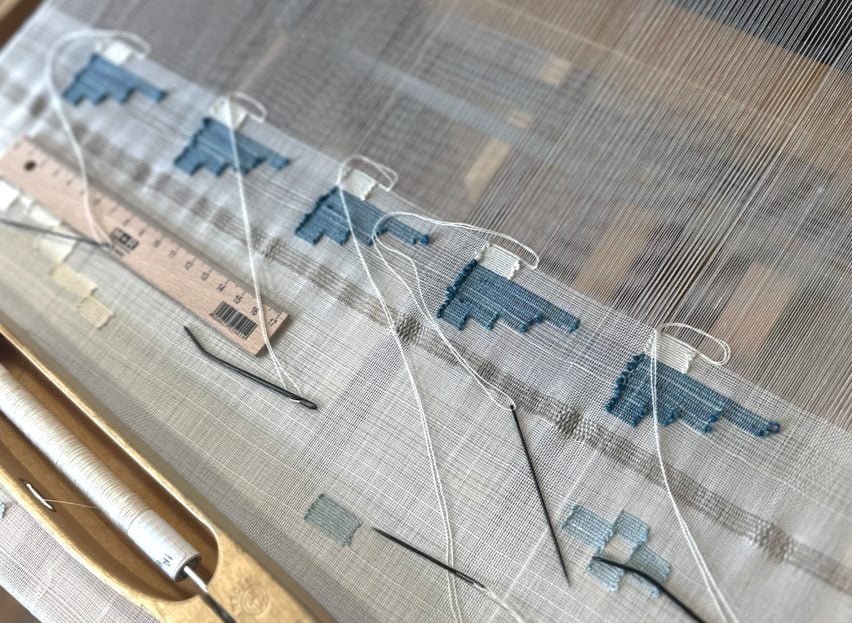
Woven Figures by Anika Alamin
“Drawing from my cultural heritage, this woven textile explores the qualities of Dhaka muslin and investigates British colonial rule in Bangladesh using indigo and jute.
“British art institutions and museums are rooted in colonialism.
“The juxtaposition of European looms with the use of traditional Bangladeshi Jamdani weaving technique allows the work to respond to the space – an opportunity previously inaccessible to Bangladeshi women.
“‘Heritage’, ‘erasure’, ‘silenced’ and ‘passage’ are words collected from members of the Bangladeshi diaspora community in Brick Lane.
“These words and the names of the important women figures in my life have been recorded into the textile.”
Student: Anika Alamin
Course: Graduate Diploma Textile Design
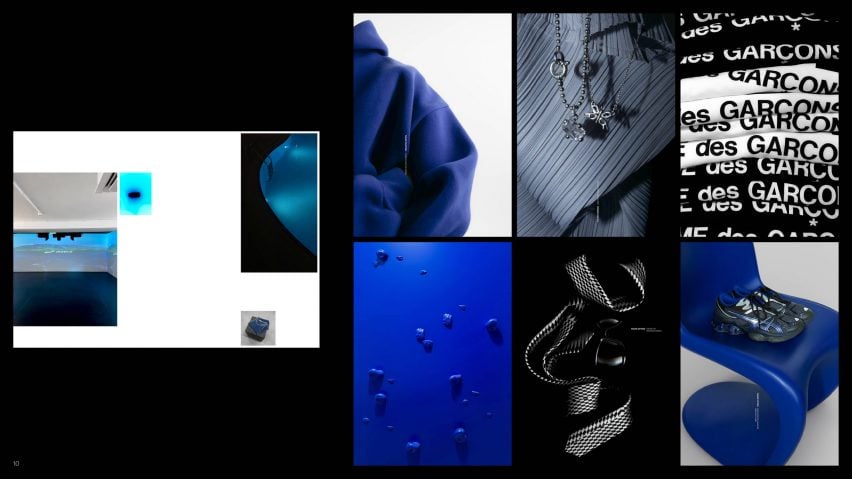
Artefacts by Natasha Lesiakowska
“Artefacts is a monographic visual publication that responds to the details of objects, clothing and materials that represent my design practice.
“It contains a collection of visual studies that encapsulate my interests in detail; appreciating the influences that have shaped my aesthetic – where contemporary culture and interdisciplinary practices intersect.
“Artefacts are the particularities that influence my identity beyond clothing and into design.
“It embraces the archive, forming an unconventional self-portrait and a catalogue of my design identity.”
Student: Natasha Lesiakowska
Course: BA Graphic Design Communication
Email: contact[at]natashalesiakowska.com
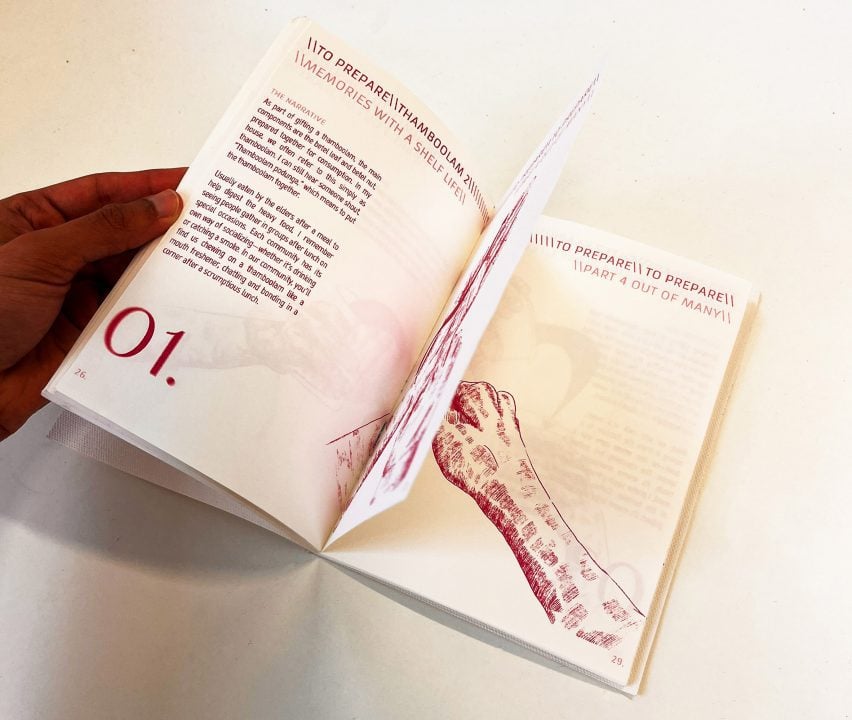
Memories with a Shelf Life by Drishya Subramaniam
“In a future where current traditions and cultures are affected by globalisation, how can design intervene to preserve and shape cultures for generations ahead?
“Memories with a Shelf Life began as I moved from India to the United Kingdom, sparking my quest to reconnect with my cultural heritage.
“While similarities surfaced, profound differences emerged, shaped by the legacy of colonisation.
“This fusion of cultures mirrors the transformative effects of contemporary globalisation, which allows individuals to freely adopt elements from diverse cultures.
“Ultimately, my work explores heritage conservation and the enduring nature of cultural identity in the face of globalisation.”
Student: Drishya Subramaniam
Course: Graduate Diploma Graphic Design
Email: subramaniam.drishya[at]gmail.com

Sky City by Yehang Chen
“Skateboarding is an extreme sport and its essence is actually a subculture.
“In every society, there are impacts and changes produced by the dominant culture in the face of subcultures.
“My project is mainly a venue for subcultural group activities, but the theme of the whole venue is still about skateboarding.
“The interior of the building contains a skateboarding venue, an accommodation venue, bar, restaurant, a stage and other functions.
“I referenced the flow that skateboarding has in the shape of the building.”
Student: Yehang Chen
Course: Graduate Diploma Interior Design
Email: y.chen0576[at]qq.com
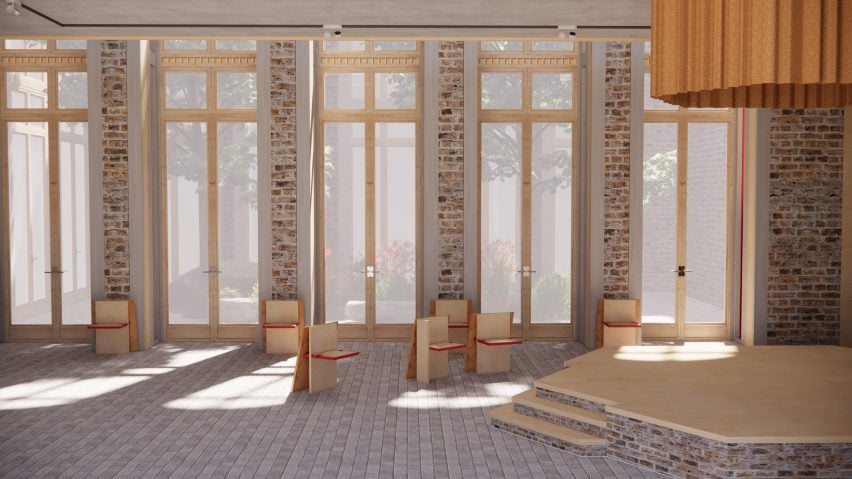
The Artist Neighbourhood by Daniel Bentley
“The Artist Neighbourhood is all about autonomy; designed to insert artists into spaces that typically exclude them.
“Essentially, the project provides a home in the heart of Soho for artists, where creative camaraderie is fostered by a flexible, sociable environment.
“Graduates and students live in one of eighty-seven self-contained flats, above fourteen studios on the ground and first floor.
“Talent is shared between residents in collaborative settings that demystify creative industries.
“Affordability and accessibility are paramount to the neighbourhood’s fabric; considerate, compact design and an innovative financial model makes urban living a reality for young creatives.”
Student: Daniel Bentley
Course: BA Interior Design
Email: danielbentley[at]danielbentley.design
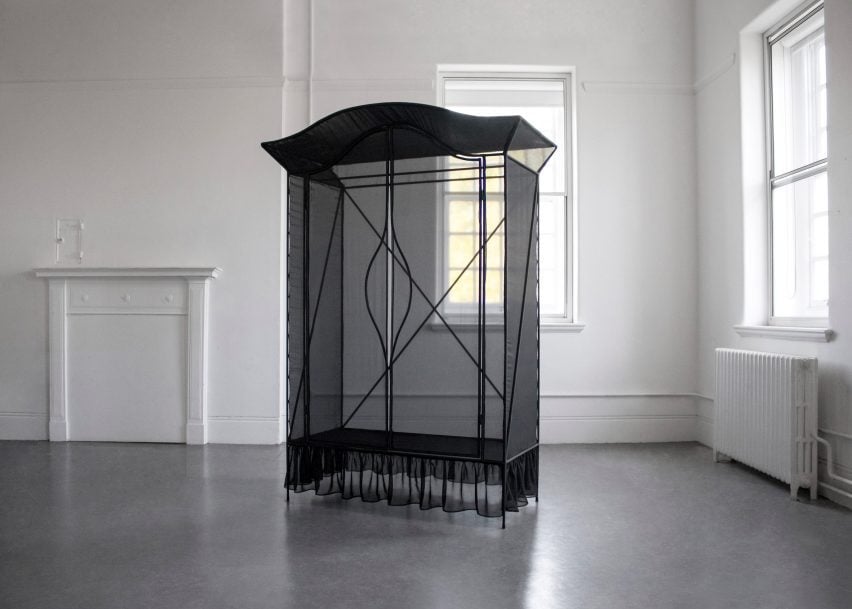
Post War Drobe by Maria Gil
“The idea of ‘Post War Drobe’ is to reimagine Polish design history, envisioning an alternative reality where postmodernism had the chance to exist.
“While in the west in the late 20th century a movement of playful experimentation in design was flourishing, Polish design faced challenges due to economic and political crises.
“Combining contrasting rebar and fabric, often used as substitutes for traditional furniture materials due to resource shortages, post war drobe references classical wardrobes from before world war two.
“It mourns the lost cultural heritage, destroyed and looted from Poland during the war.”
Student: Maria Gil
Course: BA Product and Furniture Design
Email: mary[at]gheell.com
Partnership content
This school show is a partnership between Dezeen and University of the Arts London. Find out more about Dezeen partnership content here.

